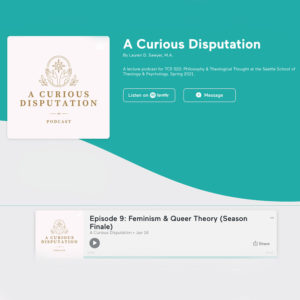What can you expect from online learning in low-residency programs at The Seattle School?
While asynchronous learning was well underway before the pandemic, the necessity of transitioning to online learning helped accelerate both our timeline and innovation among our faculty members. With no other choice but to teach online, our professors rose to the challenge in remarkable ways to deliver not only engaging but truly unique classroom experiences to students.
Incoming students who choose to pursue graduate school through our low-residency programs can expect to be engaged no less than those learning in person. Core to our mission is transforming relationships and we believe, particularly for those who want to pursue their calling in their current location, the ability to learn while rooted in your community is vital.
But what does innovative online learning look like in practice? Transitioning to teaching online was not without its challenges, but the ability to increase accessibility across formats and locations proved invaluable. We had the privilege of speaking with three faculty who shared with us how they were able to adapt their teaching styles to best engage students online.
Read how a few of our courses were taught in unique and collaborative approaches over this past year.
Lauren Sawyer, MA: Philosophy
“I find that philosophy is a subject that requires at least some teaching in the form of lectures. Especially for those who have not read philosophical texts recently—or at all—it’s hard to pick up a chapter from Immanuel Kant’s Groundwork of the Metaphysics of Morals and understand what the hell is going on, even with some engaging secondary sources.

I decided to record my lectures as podcast episodes for a few reasons. Some were practical: so that my students could listen to the lecture on their own time and so that I didn’t have to stress about creating slides or looking bright-eyed on camera every week. But it also allowed me to present the content in more creative and different ways than I would have had I lectured synchronously, in-person, or on Zoom.
I rely on some of the strategies of my favorite podcasts: storytelling; intentional pauses and slow-downs; clips, music, and sound effects; voice acting, and conversational interviews. In one episode, I give a “People’s History of the Enlightenment” by telling a (mostly) historically accurate account of a witch-hunt in light of the major cultural and intellectual shifts of the 17th century.
In almost all the episodes, I interview content experts or include voice work done by my friends. This way I can include a diversity of voices and ideas that are not represented in the philosophers we’re studying (especially as we are reading mostly male Continental thinkers). I decided to use the podcasting platform, Anchor.fm, to enhance my students’ experience—they can subscribe and access the podcast on their phones. Anchor provides me with data on how many students are listening and at what point in the episodes they tune out. I’m a bit of a data nerd; having this extra bit of information helps me fine tune the podcast for future courses. It has shown me, too, that I have an audience beyond the 16 students in my class! The podcast is called ‘A Curious Disputation,’ a borrowed line from Tertullian’s infamous text that asks, ‘what has Athens (philosophy) to do with Jerusalem (theology)?’”
Dr. Ron Ruthruff: Engaging Global Partnerships
Dr. Ron Ruthruff faced a unique challenge in needing to adapt a course that typically takes place on the ground in Guatemala to students’ homes. How does one replicate the sights, interactions, and in the moment learnings of being in a different country?
“The thought of going online with a class usually held in Guatemala seemed ridiculous, until I began to plot and plan with my Guatemalan Colleague. Dr, Joel Aguilar. Making this pivot to an online format intentionally grew us in at least three areas of the course: The uses of film study and required readings, student engagement and application, and faculty collaboration.
We folded the readings and film study that were part of pre-trip preparation into the course to serve as an asynchronous way to establish a solid understanding of the socio-political and religious history of Guatemala. Conversation via Zoom and online discussion boards were tethered more directly to the film study and required readings instead of being frontloaded on the trip, which helped us dissect and digest the material more effectively.
Students who wanted to engage with the material but had barriers to international travel have welcomed the opportunity to take an international course without needing to leave home. Moving the course online also afforded us the opportunity to bring the course ‘home’ as we were able to invite a panel of Pacific Northwest activists to talk about how they are serving local Latinx communities, allowing students to connect global wounds of colonialism to [events?] in their own backyards.
Perhaps most importantly, this format allowed me the opportunity to work more closely and collaboratively with my dear friend and colleague, Joel Aguilar, rather than me front-loading theoretical information to students and Joel planning a 7-day vision trip. We met every Friday via Zoom to plan for the following week. Needless to say the pandemic, quarantine, and the demand to pivot to online modalities was not easy, but we are learning and growing, and while I long to be back with my friends around the world, we are allowing what has been an incredible challenge to also be our teacher.”
You can learn more about low-residency learning opportunities in our Master of Divinity, Master of Arts in Theology & Culture, and Master of Arts in Counseling Psychology programs.


